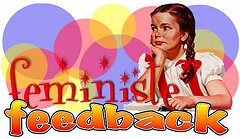
A great call for suggestions:
I’m a young feminist librarian in my first out of grad-school professional job, and I’ve already volunteered to fix up the feminist section of our library, which consists of about 8 books entirely about second-wave white women. My boss is only letting me purchase 3-4 new books for the section, and we’ll see how well those check out. But I don’t really know what to buy. Our non-fiction standards are pretty tight, and we only purchase books published in the last 5 years unless there is an extraordinary need and I want something that is third-wave and diverse. I could go with Full Frontal Feminism and/or It’s A Jungle Out There, but I really would like something that focuses more on WOC because we have a lot of Hispanic and black residents here. And given the anger towards Seal Press, I would like to find some alternatives. I would like to keep it on an “intro to feminism” level, at least for now. Anyone have any suggestions?
Any thoughts? Which feminist books must a library have?